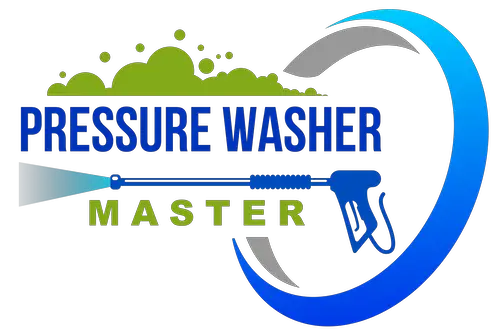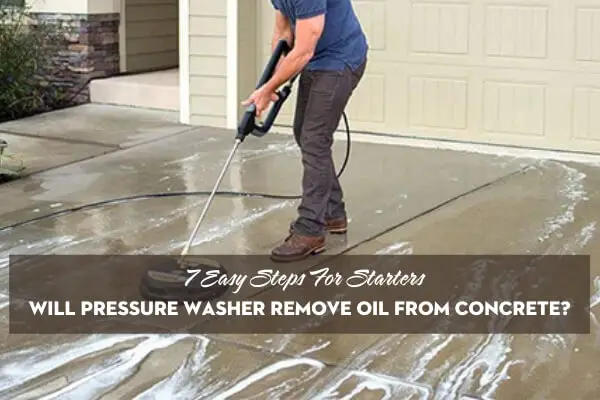Most homeowners are familiar with the incidence of motor oil and persistent grease stains on driveways. Concrete is porous, and driveway concrete has a different polish than inside concrete.
Oil or grease seeps into the pores of concrete and fractures, making cleaning more difficult. Therefore, you should take care of these dirty spots right away before they set in on your concrete by pressure washing oil stains. Fortunately, the task isn’t too tricky. With suitable materials and tools, you can clean this mess up in no time.
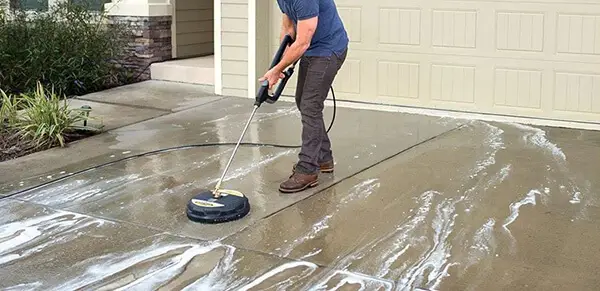
In this article, I will answer your question, “Will a pressure washer remove oil from concrete?’’ and tell you how to get oil off the concrete driveway.
Will Pressure Washer Remove Oil From Concrete?
Not only are oil stains unattractive and sometimes dangerous, but they’re also challenging to remove. Most of us will have to cope with the stain left by an oil spill at some point.
Whatever method you use to remove oil stains will need time and some human labor. Power wash oil stains off the driveway is one of the best methods. Power washers utilize hot water, which, as you probably know from dishwashing, eliminates oil and grease far more easily than cold water.
However, a pressure washer is also a quick and straightforward technique to remove oil stains from a concrete driveway. Use a hot water pressure washer to rinse off any leftover oil discolored or pierced the concrete surface after absorbing the surplus oil from apparent oil puddles.
The process of pressure washing oil stain driveway will be completed quickly using the force of a medium-duty pressure washer with a PSI rating of 2000 to 3000 PSI. If you don’t have a powerful machine, you need to clean the surface with a detergent.
How To Use Pressure Washer To Remove Oil From Concrete? Quick Tutorial For Removing Oil Stain
If you have a huge oil stain, you might want to hire a professional cleaning service. These services might be costly, but they have the necessary equipment and chemicals to remove oil stains safely. If the stain is minor, you should be able to remove it on your own.
To remove oil stains from concrete, follow this step-by-step tutorial.
-
Remove blockages
Remove any yard furniture, plant pots, tools, toys, and other items from the cleaning area. Using a big push/utility broom, sweep your driveway to remove debris such as tiny stones, twigs, leaves, and dirt.
-
Take Precautions
Gloves, eye protection, waterproof boots, and overalls are examples of personal protective equipment.
-
Soak Up
Soak up as much oil as possible using paper towels or old rags, then absorb the rest with cat litter, sawdust, or sand. Allow 20-30 minutes for the stains to be absorbed entirely. Then, allow the absorbent material to rest overnight for more enormous oil puddles.
-
Sweep
Sweep away all of the absorbent material you used to soak up the oil spill using a yard broom, and after that, cleaning the residual surface stain should be done.
A thorough cleaning is necessary for spots that have dried into the concrete. First, degrease the afflicted area using a liberal amount of degreaser solution. Allow 5-10 minutes for the solution to loosen the stains. Next, scrub the stain with a firm nylon bristle brush in a circular motion.
-
Buy Cleaning Products
Read the directions on the degreaser agent you want to use. It’s a good idea to test a tiny area first to ensure it won’t stain the concrete.
-
Apply The Cleansers
Apply the cleansers to the oil stain and let it sit for the specified time (see container for details).
-
Pressure Wash
Rinse with a pressure washer once the degreaser has time to remove all remnants of the oil stain and the degreaser on the concrete. The best tool for this operation is a power washer, but a pressure washer will suffice.
There are two nozzle attachments you should have for cleaning oil stains. The first nozzle has a 12-inch spread and is used to clean big surfaces. Next, you’ll need a rotating nozzle, also known as a high-pressure nozzle, to tackle the oil stain since it will assist in penetrating deep into the concrete.
You can skip steps 3 and 4 if the oil stain has been there for a long time. It’s usually preferable to deal with an oil spill as quickly as possible since the longer it sits there, the more difficult it is to clean up.
After the concrete has dried, we recommend using a concrete sealer to preserve it and prevent stains from developing.
Check out this video if you want to watch the whole process of pressure washing oil stains:
How Can You Make The Work Easier?
Utility/Push Broom
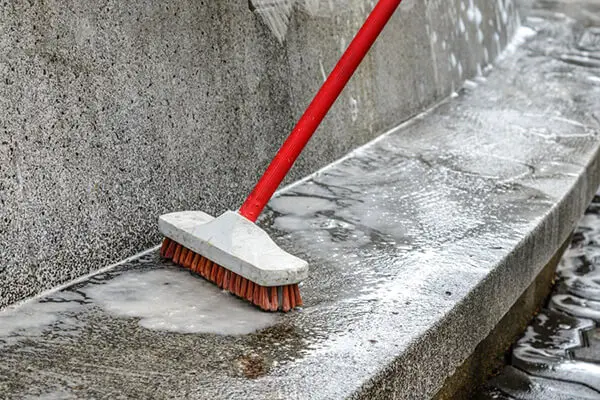
A utility broom, often known as a push broom, is essentially a broad brush attachment. You’ve probably seen these before.
Many construction workers sweep with push brooms because the broad brush covers a larger area. It’s also quite long-lasting. The bristles on the brush are generally stiff. Pushing garbage into a pile to be dumped is how you use a push broom.
Water Broom
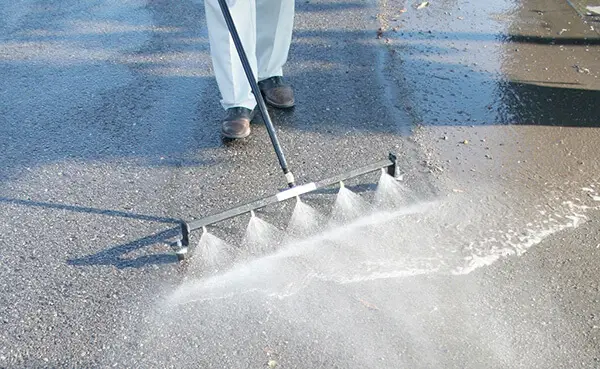
A water broom attachment resembles a push broom, except that it has numerous nozzles lined up horizontally at the end. You’ll be able to cover a larger area with fewer passes this way. Instead of using the wand, you’d attach it to your pressure hose and use it to rinse away the detergent.
Cleaning Products
Something more robust than dish soap or laundry detergent may be required for tough or old oil stains. You can find a range of cleansers intended to remove oil stains at hardware stores, big-box home improvement stores, and even auto shops.
Some concrete cleaners and oil stain removers are designed to be diluted before use, but they may also be used straight for tough stains. For appropriate use, follow the manufacturer’s instructions.
Conclusion
Will a pressure washer remove oil from concrete? Oil and grease-like compounds are challenging to remove from concrete due to their stickiness. On the other hand, a pressure washing machine can solve this problem by removing dirt from any surface.
Cleaning concrete is a fundamental task that we must perform daily since it is present in so many of our environments. Stay joyful by maintaining a clean and healthy lifestyle with a pressure washer.
